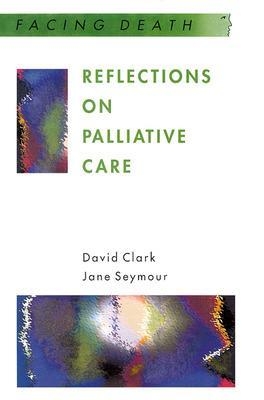
Reflections On Palliative Care
Seiten
1998
Open University Press (Verlag)
978-0-335-19454-4 (ISBN)
Open University Press (Verlag)
978-0-335-19454-4 (ISBN)
- Titel ist leider vergriffen;
keine Neuauflage - Artikel merken
Drawing on a range of sources, as well as empirical studies, this book offers a set of reflections on the development of palliative care and its place within a wider social context. It is useful for practitioners, policy makers, teachers and students involved in palliative care or concerned about death, dying and life-limiting illness.
Palliative care seems set to continue its rapid development into the early years of the 21st century. From its origins in the modern hospice movement, the new multidisciplinary specialty of palliative care has expanded into a variety of settings. Palliative care services are now being provided in the home, in hospital and in nursing homes. There are moves to extend palliative care beyond its traditional constituency of people with cancer. Efforts are being made to provide a wide range of palliative therapies to patients at an early stage of their disease progression. The evidence-base of palliative care is growing, with more research, evaluation and audit, along with specialist programmes of education. Palliative care appears to be coming of age.
On the other hand numbers of challenges still exist. Much service development has been unplanned and unregulated. Palliative care providers must continue to adapt to changing patterns of commissioning and funding services. The voluntary hospice movement may feel its values threatened by a new professionalism and policies which require its greater integration within mainstream services. There are concerns about the re-medicalization of palliative care, about how an evidence-based approach to practice can be developed, and about the extent to which its methods are transferring across diseases and settings.
Beyond these preoccupations lie wider societal issues about the organization of death and dying in late modern culture. To what extent have notions of death as a contemporary taboo been superseded? How can we characterize the nature of suffering? What factors are involved in the debate surrounding end of life care ethics and euthanasia?
David Clark and Jane Seymour, drawing on a wide range of sources, as well as their own empirical studies, offer a set of reflections on the development of palliative care and its place within a wider social context. Their book will be essential reading to any practitioner, policy maker, teacher or student involved in palliative care or concerned about death, dying and life-limiting illness.
Palliative care seems set to continue its rapid development into the early years of the 21st century. From its origins in the modern hospice movement, the new multidisciplinary specialty of palliative care has expanded into a variety of settings. Palliative care services are now being provided in the home, in hospital and in nursing homes. There are moves to extend palliative care beyond its traditional constituency of people with cancer. Efforts are being made to provide a wide range of palliative therapies to patients at an early stage of their disease progression. The evidence-base of palliative care is growing, with more research, evaluation and audit, along with specialist programmes of education. Palliative care appears to be coming of age.
On the other hand numbers of challenges still exist. Much service development has been unplanned and unregulated. Palliative care providers must continue to adapt to changing patterns of commissioning and funding services. The voluntary hospice movement may feel its values threatened by a new professionalism and policies which require its greater integration within mainstream services. There are concerns about the re-medicalization of palliative care, about how an evidence-based approach to practice can be developed, and about the extent to which its methods are transferring across diseases and settings.
Beyond these preoccupations lie wider societal issues about the organization of death and dying in late modern culture. To what extent have notions of death as a contemporary taboo been superseded? How can we characterize the nature of suffering? What factors are involved in the debate surrounding end of life care ethics and euthanasia?
David Clark and Jane Seymour, drawing on a wide range of sources, as well as their own empirical studies, offer a set of reflections on the development of palliative care and its place within a wider social context. Their book will be essential reading to any practitioner, policy maker, teacher or student involved in palliative care or concerned about death, dying and life-limiting illness.
Jane Seymour, Sue Ryder Care Professor in Palliative and End of Life Studies, School of Nursing, Faculty of Medicine & Health Sciences, University of Nottingham, Nottingham, UK
Part one: Death in society
The social meaning of death and suffering
Living and dying
Ageing, dying and grieving
The ethics of dying
Summary and critique
Part two: The philosophy and practice of palliative care
History and development
Definitions, components and meanings
Routinization and medicalization
Part three: Policy issues
Policy development and palliative care
The delivery of palliative care services
Part four: Conclusions
The future for palliative care
References
Index.
| Erscheint lt. Verlag | 16.12.1998 |
|---|---|
| Zusatzinfo | references, index |
| Verlagsort | Milton Keynes |
| Sprache | englisch |
| Maße | 152 x 229 mm |
| Gewicht | 362 g |
| Themenwelt | Medizin / Pharmazie ► Gesundheitswesen |
| Medizin / Pharmazie ► Medizinische Fachgebiete ► Schmerztherapie | |
| Medizin / Pharmazie ► Pflege ► Palliativpflege / Sterbebegleitung | |
| Studium ► Querschnittsbereiche ► Prävention / Gesundheitsförderung | |
| Sozialwissenschaften ► Soziologie | |
| ISBN-10 | 0-335-19454-0 / 0335194540 |
| ISBN-13 | 978-0-335-19454-4 / 9780335194544 |
| Zustand | Neuware |
| Haben Sie eine Frage zum Produkt? |
Mehr entdecken
aus dem Bereich
aus dem Bereich
das Manual zur psychologischen Gesundheitsförderung
Buch | Hardcover (2023)
Springer Berlin (Verlag)
39,99 €
Orthomolekulare Medizin in Prävention, Diagnostik und Therapie
Buch | Hardcover (2022)
Thieme (Verlag)
71,00 €


